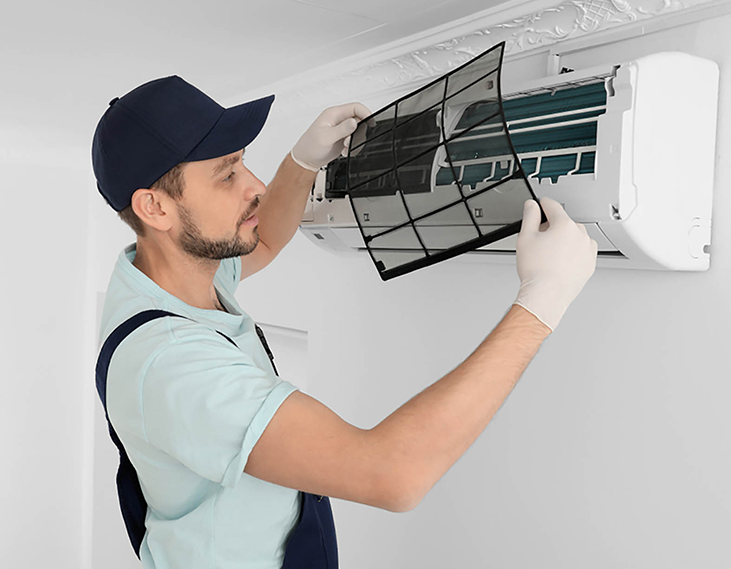For those living with asthma or allergies, clean indoor air is essential. Allergens like pollen, dust, pet dander, and mould can trigger symptoms and make daily life difficult. Modern air conditioning systems do more than cool—they help improve indoor air quality. When professionally installed and regularly maintained, they filter out airborne irritants, creating a healthier and more comfortable environment for anyone with respiratory conditions or sensitivities.
In this blog, we explore how air conditioning helps reduce allergy and asthma symptoms, how to get the most out of your system, and why regular upkeep is so important.
How Air Conditioning Supports Respiratory Health
Air conditioning systems offer several benefits that support respiratory health. One of the most important is their ability to filter out airborne allergens. As air circulates through the system, filters trap common irritants such as pollen, dust, and pet hair. This helps prevent these particles from being recirculated throughout the home.
Good air conditioning systems also promote continuous airflow, keeping the indoor environment fresher and more comfortable. For anyone sensitive to airborne allergens, consistent and clean airflow can make a noticeable difference in symptoms.
Additionally, air conditioners can help control indoor temperature, which may ease breathing difficulties in extreme heat or humidity, common triggers for people with asthma.
Allergens vs. Air Conditioning Benefits
Below is a helpful comparison showing how common allergens affect health and how air conditioning can help:
Common Allergen | Effect on Health | How Air Conditioning Helps |
Pollen | Sneezing, itchy eyes, wheezing | Filters capture airborne pollen |
Dust & Dust Mites | Asthma attacks, difficulty breathing | Lowers humidity levels, reducing dust mite population |
Mould Spores | Respiratory irritation, allergic reactions | Maintains dry air to prevent mould growth |
Pet Dander | Runny nose, wheezing, itchy throat | Filters remove dander from circulating air |
Outdoor Pollutants | Increased asthma symptoms | Keeps windows closed while maintaining fresh airflow |
Humidity Control and Why It Matters
Humidity plays a key role in indoor air quality. Too much moisture in the air encourages the growth of mould and dust mites—both strong allergy triggers. The ideal indoor humidity level is between 30% and 50%.
Air conditioning systems help maintain balanced humidity by removing excess moisture from the air. This not only makes the home feel cooler but also reduces the chances of mould or mildew forming on walls, ceilings, and furnishings.
If your home is located in a naturally humid area or if you often notice dampness, musty smells, or condensation on windows, you might benefit from a dehumidifier. Many air conditioning systems can be paired with dehumidifiers for even better control.
The Importance of Filter Quality
One of the most powerful features of any air conditioning system is its filter. Filters are responsible for catching airborne particles before they enter your living space. However, not all filters are created equal.
Standard filters catch large particles like dust and lint, but for better protection, you can upgrade to HEPA filters or filters with a high MERV (Minimum Efficiency Reporting Value) rating. These are designed to capture much smaller particles, including those that commonly trigger allergies and asthma.
It’s important to note that not every system supports these high-grade filters, so it’s wise to speak with an expert from a trusted air conditioning company London to find out what’s best for your home.
Equally important is filter maintenance. Filters should be checked regularly and changed at least every few months, depending on usage and local air quality. A dirty filter can do more harm than good by blowing trapped particles back into your home.
Using Air Purifiers Alongside Air Conditioning
If you or a family member has severe asthma or allergies, an air purifier can provide extra protection. While air conditioners filter many particles from the air, purifiers are specifically designed to remove even smaller irritants.
There are standalone units available for single rooms or whole-home air purifiers that work with your air conditioning system. Many models use HEPA filters or UV light to kill bacteria, trap fine particles, and even neutralise odours.
When used in combination, air conditioning and air purifiers can drastically reduce the number of allergens present in your indoor environment.
Zoning Systems for Targeted Comfort
Zoning systems allow you to control the temperature and air flow in different areas of your home. This is especially helpful if someone in the household suffers from allergies or asthma.
With zoning, you can keep certain rooms—such as bedrooms or living rooms—cooler and better filtered without having to run the system throughout the entire house. It’s also energy-efficient, as it reduces the amount of power needed to maintain comfort where it matters most.
This targeted approach ensures cleaner, fresher air in the rooms you use the most, which can be a great help during allergy season.
The Role of Maintenance and Servicing
Regular maintenance is essential to keeping your air conditioning system working effectively and safely. Over time, dust and debris can build up in filters, coils, and ducts, reducing the system’s performance and allowing allergens to spread through your home.
A neglected system can also become a breeding ground for mould and bacteria, particularly if moisture is allowed to collect inside the unit.
Professional servicing, such as that offered by air conditioning repair London specialists, includes thorough cleaning of internal parts, filter replacement, and inspection of components to ensure the system is working as it should. It’s recommended to have your system checked at least once a year, ideally before the warmer months when it will be in regular use.
Bonus Benefit: Energy Efficiency and Smart Ventilation
Modern air conditioning systems are designed to be energy-efficient, providing better cooling and air filtration without high energy costs. Many systems come with smart thermostats and scheduling features, allowing you to control operation times and temperatures precisely.
Additionally, ventilation systems like HRVs (Heat Recovery Ventilators) and ERVs (Energy Recovery Ventilators) bring in fresh air from outside while maintaining indoor temperatures. This reduces the need to open windows and helps keep out outdoor allergens like pollen and vehicle emissions.
With a good ventilation setup, you’ll enjoy better airflow, improved air quality, and reduced exposure to allergens—all without losing comfort or increasing energy bills.
Conclusion: A Breath of Fresh Air Indoors
Air conditioning does more than cool your home—it helps create a cleaner, healthier space by filtering allergens, reducing humidity, and improving airflow. For those with asthma or allergies, this can greatly enhance daily comfort. To maximise these benefits, it's essential to choose suitable equipment, use quality filters, and schedule regular maintenance. If your system needs attention, a trusted air conditioning company in London can help. Hamilton Air Conditioning Ltd offers expert air conditioning repair, ensuring your system runs efficiently and supports better indoor air quality all year round.








